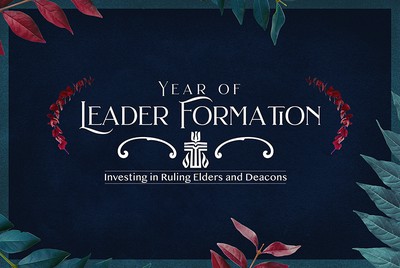Newly elected and ordained ruling elders and deacons in the Presbyterian Church (U.S.A.) can now access resources that will guide them in understanding the constitutional questions of the denomination.
"Coming Alive in Christ: Training for PC(USA) Ruling Elders and Deacons based on the Constitutional Questions" is the first initiative launched as part of the Church’s Year of Leader Formation. The program was announced in December by the Office of the General Assembly to focus on training for this part of church ministry.
“The Book of Order provides the constitutional questions asked of leaders when they are ordained, installed and commissioned in the PC(USA),” said Martha Miller, with Ministry and Education Support with the Office of the General Assembly. “This new resource provides a study of these beliefs that are central to our lives of faith in our community.”
The free multi-session resource is offered through EQUIP, the Church’s online training platform. Content is provided by a diverse group of ruling elders and teaching elders from across the denomination, including Ruling Elder Vilmarie Cintrón-Olivieri, Co-Moderator of the 223rd General Assembly, who focused on the constitutional question directed toward ruling elders (W-4.0404).
“We are all called to serve God and the people and to do so together, in a shared ministry,” she wrote. “Although each officer is ordained to specific functions, we all answer the same first eight constitutional questions.”
Cintrón-Olivieri says the most important things ruling elders and deacons should get from her contribution is the need for mentoring and discipleship.
“Other faith siblings who had journeyed in this ministry before me, especially my grandfather Edgar, offered wisdom and words of encouragement. This support enabled me to live into the particular gifts I brought to the session and, eventually, to other councils,” she said. “Alongside these, taking the time to study and be familiarized with the constitution of the Presbyterian Church (U.S.A.) — The Book of Confessions and The Book of Order — opened my eyes to the beauty of our theology, governance and shared ministry.”
The Rev. Dr. David Gambrell, associate for Worship in the Presbyterian Mission Agency’s Office of Theology and Worship, also contributed and served on the editorial team.
“I appreciate that this resource for the formation of church leaders is rooted in the sacrament of baptism — the theological source of our common ministry in Christ’s name,” he said. “Using the gifts poured out by the Spirit, we are called to serve God in every aspect of our lives. This is one of the deep instincts of the Reformed tradition.”
Gambrell says he’s grateful for the way the resource unpacks the constitutional questions asked of each person ordained to ordered ministry in the denomination.
“The questions themselves come alive as they are interpreted by a thoughtful and diverse group of writers,” he said. “Now each time we hear these words they will have new resonance and fresh insights for the whole Church.”
Miller says the resource material can be used for self-study, which includes questions for reflection and/or discussion. Additional tools include monthly leader and retreat leader guides, PowerPoint slides and printable PDFs.
The Rev. Luke Choi, manager for Korean-speaking Councils Support for the OGA, has used the resource in his work with Korean church leaders. He says the word “ambitious” comes to mind when he reviews the resources for “Coming Alive in Christ.”
“This training module really runs the gamut of learning experiences with supplemental PowerPoint visuals and multiple instructional settings,” he said. “It provides a rich variety of perspectives and expository styles afforded by the works of diverse ruling elders and teaching elders from across the PC(USA) — hence, none of the sections are alike, which allows for more interesting educational endeavor.”
Choi says he also appreciates that the materials are drawn from a balance of references, including Scripture, The Book of Order, Book of Confessions, Church history and Reformed theology.
Many of the contributors say church support is vital in this ministry. Cintrón-Olivieri says the best thing churches can do for ruling elders and deacons is to love, support, encourage and pray for them.
“Leading is difficult at any time, yet these are particularly trying times,” she said. “When we remember the church is not ours, but God's, and that the Holy Spirit is at work, we can focus on mutual encouragement and in the ministry we can do together.”
“The sessions are packed with biblical and confessional content — and at the same time brief, accessible and engaging,” said Gambrell. “I know this resource will be a great blessing to the Church as God uses it to shape and equip a new generation of deacons and ruling elders.”
Miller says work is already underway to provide the resources to Spanish and Korean congregations.
"We’re not simply providing straight translations from English to Spanish and Korean,” she said. “We are working to make these materials culturally appropriate.”
Cintrón-Olivieri offers advice to the sessions and pastors as they prepare new officers for ministry.
“Invest time in thorough and comprehensive ruling elder and deacon training. Give them copies or share links to The Book of Confessions and The Book of Order. Keep the channels of communication open,” she said. “Encourage newly elected officers to live into their unique gifts and to serve God and the people wholeheartedly, as one of the constitutional questions states, with energy, intelligence, imagination and love.”

